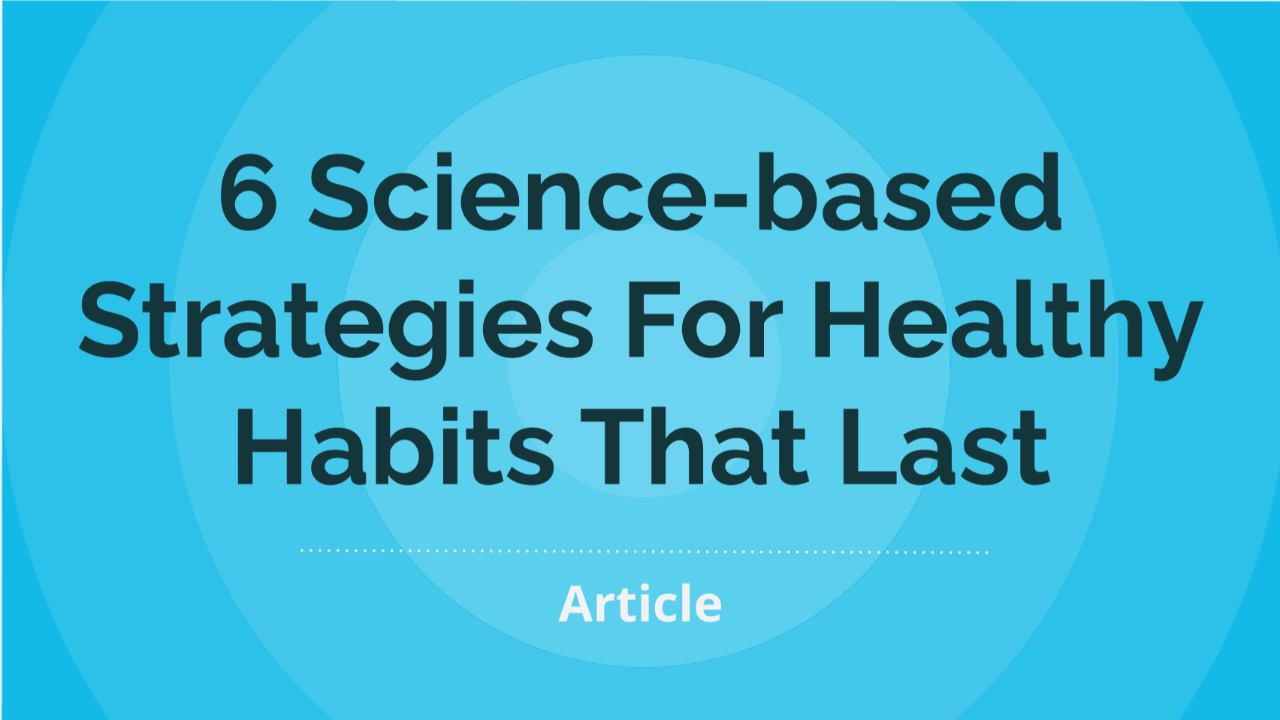6 Science-Based Strategies For Healthy Habits That Last
Dec 18, 2022
The New Year has arrived, and so begins the season in which we are inspired to make lasting changes that may enable us to lead a happier and healthier life. So, how can we acquire lasting healthy habits that allow us to achieve our goals?

The Neuroscience of Habit Change
Habits are actions that are so integrated into our system that we perform them without thinking. We all know the challenges of breaking old habits and the effort required to begin new ones. Our brain has specific regions (notably the striatum, dopaminergic nuclei and cerebral cortex) that work together as a network and activate when we perform an action repeatedly over time, which produces feelings of reward, and helps us achieve goals. The brain works through repetition. This is why we have developed habits that began as actions, and after repeating them throughout our lives - and therefore activating these brain networks over and over - they become automatic behaviors.
Creating new and lasting habits
Procrastination, lack of consistency and daily-life overstimulation can hinder setting healthier habits. Because the neural circuits associated with our existing habits have strengthened over time, we can also feel a sense of resistance to change. As a result, it can seem very difficult to introduce new healthier habits into our lives.
Biologically, creating habits that last requires us to activate our nervous system to generate new circuits that support the performance of new actions. This is called neuroplasticity, the creation of new neural pathways. We can change our brain's circuitry and how it functions by repeatedly paying attention to the actions that lead to lasting healthy habits.
Where our attention goes, energy flows, and change follows.
Motivation and willpower are strategies that many commonly rely on to make changes. While effective in the short term, this self-discipline requires a lot of energy, and alternative methods are needed to support further habit formation. Research shows that practicing mindfulness, self-compassion, setting intentions and creating environmental cues can help create healthy habits that endure.
New routines have a higher likelihood of lasting if they are based on making us feel good. This goes hand in hand with self-compassion. Ideally, we want to change for the better and improve our quality of life, and this is based on a foundational mindset that we care about ourselves. We can cultivate self-understanding rather than self-punishment when we fall short of our goals.
Set intentions that specify where, when and how your goal will be acted upon. Goals are important because they set our destination, but intentions are critical because they set our direction. For example, a study from the Journal of Experimental Social Psychology has shown that those who establish “implementation intentions” are more likely to create stable habits over two months than those who do not.
Create environmental cues. These eye-catching prompts can cue you in different situations to facilitate the performance of alternative behaviors. Examples are: placing post-it note reminders in commonly accessed areas, putting your gym bag by the front door to make it easier to leave the house to workout or switching your phone to airplane mode to avoid the temptation of checking it when you’re spending time with others.
6 Science-based strategies to create healthy habits that last
Start with understanding that the more we repeat, the quicker we can transform repeated actions into new habits.
Before falling asleep at night and as soon as you wake up, try one or two of these strategies and see what works for you:
1. Take time for reflection and contemplation
Take a mindful pause for a few minutes to bring yourself into a kind, aware and reflective state, ready to cultivate new healthful actions. Try this brief mindful pause practice you can do at any time.
2. Set clear intentions
Set a clear intention for your day and gain an understanding of why you want to achieve a particular goal. For example, are you aiming to help a health condition? To understand yourself better? To grow spiritually? Reflect on this first, and then be specific with your intention. Then, prompt yourself as you awake, “My intention for today is to…..” You are directing your attention toward where you want it to go throughout the day. At the end of the day, ask yourself, “Did I live my intention?”
3. Visualize achieving your goals
Close your eyes and visualize yourself performing the actions that take you to achieve your aspirations. Imagine you are the movie's main character, and you are living your life having achieved your goals. How does it feel? Visualize even the details.
4. Journal your goals and that which you're grateful for
Journal. Make your goals explicit by writing them down or create a regular practice of listing three things you are grateful for daily. Gratitude conditions our attention to focus on the potential of any situation and may help shift us out of a focus on the negative, which can limit possibilities in the moment.
5. Create environmental cues that can serve as helpful reminders
Environmental cueing: be creative and help yourself to remember during the day to implement the actions needed to achieve your goals. Stick post-its on the fridge, set alarms, or change positions that work as a reminder to perform actions.
6. Regularly revisit your goals and intentions
Be persistent, kind and thankful to yourself. Regularly revisit your goals and intentions for a healthier and happier life. Remember that motivation is great, but repetition is what will help create healthy habits that will stand the test of time.
Habits are a fundamental aspect of our existence and are essential for freeing up our cognitive capacities so they can be directed to engaging complex experiences. We can acquire healthy habits by implementing specific intentions to carefully plan our actions and use our environment for cueing us in a way that will influence our behaviors. So be kind and give yourself credit for simply setting the intention to live a happier and healthier life!

Michael Apollo, MHSc, RP, is the founder of the Mindful Institute. Michael is the former Program Director of Mindfulness at the University of Toronto. He is an educator, licensed mental health clinician and certified facilitator in Mindfulness-Based Stress Reduction and Mindfulness-Based Cognitive Therapy.
References:
Dorsal Striatal Circuits for Habits, Compulsions and Addictions | Frontiers in Systems Neuroscience
Want to Change Your Habits? Change Your Environment | Psychology Today
Mindfulness and Behavior Change | Harvard Review of Psychiatry
Join our weekly newsletter for insightful articles and free events
Be the first to learn about upcoming FREE events, receive early bird pricing for courses and stay in touch with weekly newsletters!


